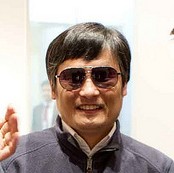The saga of Chen Guangcheng, the blind legal activist who sought refuge in the U.S. embassy in Beijing this past week, is still unfolding. Yet the Obama administration appears to have encountered its own version of President Dwight Eisenhower’s “Hungary 1956” moment: the point at which idealistic rhetoric about U.S. support for freedom and democracy collides with the harsh realities of U.S. national interests.
As long as Chen was detained in internal exile in the village of Dongshigu, he was an out-of-sight martyr for whom rhetorical support could easily be expressed without too much risk of damaging the larger Sino-American relationship. But Chen’s flight to the sanctuary of the U.S. embassy occurred right before Secretary of State Hillary Clinton and Secretary of the Treasury Tim Geithner were due in Beijing for another session of an annual bilateral Strategic and Economic Dialogue between the two countries.
U.S. officials were eager to make progress with China on a whole host of issues at this year’s talks. Clinton was hoping to see China increase its engagement “on the highest-priority regional and global issues,” including Iran and North Korea. Meanwhile, Geithner was expecting progress on a particularly sensitive matter -- allowing the value of the renminbi to appreciate. And unlike in 1989, when Chinese astrophysicist Fang Lizhi sought refuge in the U.S. embassy in the aftermath of Tianamen Square crackdown (and was ultimately allowed to leave the country), the U.S. does not have similar leverage to deploy against China today. Is Washington going to declare an embargo on the importation of clothing and consumer electronics from China, or forbid Beijing from purchasing U.S. debt? Instead, finding a face-saving formula to get Chen out of the compound prior to the start of the strategic dialogue was the priority.

